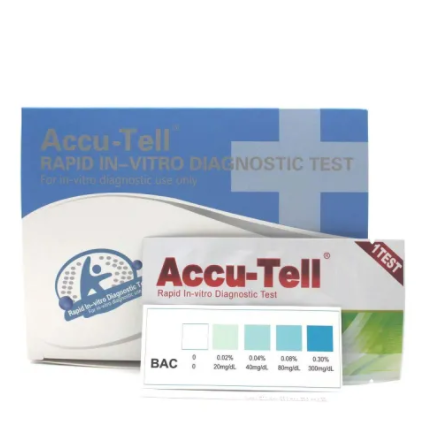How long does it take to get results from an alcohol strip test?
Introduction:
Alcohol strip tests have gained popularity as a convenient and efficient method for alcohol detection. Whether used in personal settings or professional environments such as workplaces or law enforcement agencies, these tests provide a rapid assessment of alcohol presence. In this article, we will explore the timelines associated with alcohol strip test results, considering factors that may influence the testing process and discussing the speed and reliability of obtaining accurate outcomes.
Rapid Response:
Alcohol strip tests are designed to provide quick results, offering near-instantaneous feedback on alcohol presence. Depending on the specific test brand and type, results can often be obtained within minutes, typically ranging from 1 to 5 minutes. This rapid response time allows for immediate decision-making, making alcohol strip tests valuable in various situations.
Simple Testing Process:
The simplicity of alcohol strip tests contributes to their speedy results. Most alcohol strip tests involve a straightforward process of applying a sample, such as saliva or urine, to the designated area on the test strip. The test strip contains chemicals that react to the presence of alcohol, producing observable indicators, such as color changes. Users can easily interpret the results based on the manufacturer's instructions within the stipulated time frame.
Sensitivity and Accuracy:
The accuracy of alcohol strip test results largely depends on the test's sensitivity and the individual's alcohol consumption levels. Alcohol strip tests can detect varying concentrations of alcohol, and some tests can provide a qualitative assessment, indicating if alcohol is present or absent. More advanced tests may offer semi-quantitative results, providing an estimate of the alcohol concentration within a specific range.
Factors Affecting Test Results:
While alcohol strip tests generally offer quick results, certain factors can impact the accuracy and speed of obtaining the outcomes. These factors may include the type of alcohol consumed, the amount consumed, the time since consumption, the type of sample used (saliva, urine, etc.), and the specific sensitivity of the test. It is important to follow the instructions provided with the test kit and consider any limitations mentioned by the manufacturer.
Application in Different Settings:
Alcohol strip tests find applications in various settings, including personal use, workplace testing, and law enforcement. In personal use scenarios, individuals may use alcohol strip tests to monitor their alcohol levels or as a precautionary measure before engaging in activities that require sobriety. In professional settings, such as workplaces, alcohol strip tests can assist in enforcing alcohol policies and ensuring a safe and productive environment. Law enforcement agencies may also use alcohol strip tests as an initial screening tool.
Confirmatory Testing:
It is important to note that while alcohol strip tests provide rapid results, they are considered screening tools and not confirmatory tests. If a positive result is obtained, it is advisable to follow up with more accurate confirmatory testing methods, such as blood tests or breathalyzer tests, to establish precise alcohol levels and confirm impairment.
Conclusion:
Alcohol strip tests offer a quick and reliable means of detecting alcohol presence. With their rapid response time and simplicity, these tests provide users with immediate results, facilitating prompt decision-making. However, it is crucial to consider various factors that may affect the accuracy and speed of obtaining results. By understanding the timelines associated with alcohol strip test results and their applications in different settings, individuals and organizations can make informed decisions regarding alcohol consumption and safety measures.
363
0
0


Comments
All Comments (0)